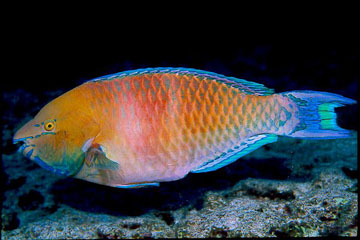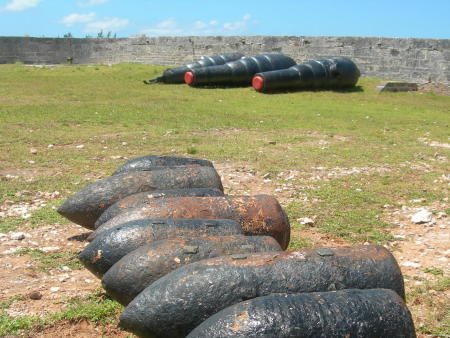





|
|
|
|
August 20, 2006
Diving back (and divers moral issues)
I'm finally back, which means that if I am going to continue to blog I need to get caught up with (yechh!) politics. In all honesty, leaving the country and spending a week away politics does not make it more attractive upon return. It's a paradox, as it is my distrust of political manipulation which fuels much of this blog. As long as I am in the middle of it, it's not so bad (it can even be fun), but returning to it is very grim. Dennis has spoiled me in my absence by writing daily posts! He's done such a great job that I almost feel like taking another week off. Might it be possible to just take another week off from politics yet still write posts in this blog? That's a pretty tall order for me, but I'll give it a try... I went SCUBA diving and snorkeling, and saw all kinds of beautiful fish and coral. That would seem to be a non-political subject. Yet, increasingly, divers are being politically scolded with heavy-handed mantras like these: More harm is done to the oceanís ecology by divers than by anything else.Really? And how is that? Putting on a mask and snorkel or a tank and then swimming around does harm to the ecology? How? The site explains: Coral reefs are beautiful and fragile systems. Despite repeated warnings, divers continue to touch coral and cause it to die. Many places in the world are rejecting requests by tourists to dive in the area because of the damage sustained to the environment. Do not be part of the problem, but rather be part of the solution by doing your part to protect the environment.I'm not into touching coral (and I don't know why anyone would want to), but unless someone hacked at it with a knife or a hammer, I'm wondering whether touching would actually make it die. There are plenty of repeated claims that touching kills coral, but I can't find a scientific study. I'd think that maybe the weighted nets hauled through coral reefs by commercial trawlers might just be a bit harder on the reef systems than the occasional human touching, though, and I wonder whether divers do as much damage as they're said to. During my dive I didn't touch anything, and I'm hard pressed to understand how I might have damaged "the ecology." But if touching coral is a problem, someone in the enforcement industry really ought to do something about the parrotfish! Everywhere I dived, I saw these large fish chomping away on coral. Not only that, I heard them! CRUNCH! CRUNCH! CRUNCH! These fish have incredibly strong beaks that bite into the coral, then grind it up and swallow it. For me to do the same type of damage, I'd have to take a pair of channel lock pliers or electrical nippers underwater, and and spend my dive shaving off pieces of coral. And I'm only in the water for less than an hour because the air runs out. They're in the water chomping on coral all day every day. Sheesh. See how quickly even something as non-political as diving can be politicized? [I think this means that despite my attempt, I have already failed to avoid politics.] At least the parrotfish are fish, and they need not worry about environmental politics. Nor do they need to worry about sexual politics, despite the fact that for them, things like sex changes and role reversals are routine: Parrotfish can and will undergo sex changes when necessary. There is a multitude of options in their world. They are born both male and female, but males can become females and vice versa when population densities are low and breeding males or females are in short supply. Some species live in a harem structure, with one male to a few females. If something happens to the male, oftentimes the dominant female will become a male and breed with the rest of the females. If another male moves in, that fish may again become female.(Via Hope's Place's discussion of parrotfish rainbow symbology.) These transsexual, er, polysexual (er, would that be "pollysexual" for parrot?) fish are down there mutilating the coral to their hearts' content, while humans get the moral lectures. Here's a picture of the rainbow eco warrior that does its thing and gets off scot-free:

 (BTW, shell collecting is bad for the environment too!) And here's a not-as-naughty nautical scene:
 Anchors are bad for coral too, and I don't even want to speculate about how the propeller might have gotten itself broken. Bermuda is surrounded by hundreds of wrecks, which I'm sure did great damage to the environment. But now they're part of the environment. Imagine, becoming part of what you damage.... Being a wreck must be tough. (I guess I'd rather visit one than be one.) posted by Eric on 08.20.06 at 11:40 AM |
|
December 2006
WORLD-WIDE CALENDAR
Search the Site
E-mail
Classics To Go
Archives
December 2006
November 2006 October 2006 September 2006 August 2006 July 2006 June 2006 May 2006 April 2006 March 2006 February 2006 January 2006 December 2005 November 2005 October 2005 September 2005 August 2005 July 2005 June 2005 May 2005 April 2005 March 2005 February 2005 January 2005 December 2004 November 2004 October 2004 September 2004 August 2004 July 2004 June 2004 May 2004 April 2004 March 2004 February 2004 January 2004 December 2003 November 2003 October 2003 September 2003 August 2003 July 2003 June 2003 May 2003 May 2002 See more archives here Old (Blogspot) archives
Recent Entries
• Holiday Blogging
• The right to be irrational? • I'm cool with the passion fashion • Climate change meltdown at the polls? • If you're wrong, then so is God? • Have a nice day, asshole! • Scarlet "R"? • Consuming power while empowering consumption • Shrinking is growth! • My dirty thoughts
Links
Site Credits
|
|